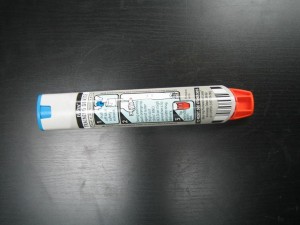
By registering for a Ontario WSIB approved, two-day standard first aid course participants will learn about a variety of emergencies including heart attacks, cardiac arrest, angina, heat stroke, hypothermia, seizures, poisonings, broken bones, spinals, concussions, hypoglycemia, asthma, anaphylaxis and more. Included in the two day course is training in cardiopulmonary resuscitation (CPR) and in the use of automated external defibrillators (AED). The latest standards are taught according to the American Heart Association (AHA) and the International Liaison Committee on Resuscitation (ILCOR) which are the governing bodies of first aid and CPR rescue techniques. The largest and highest quality provider of Ontario WSIB first aid and CPR courses as well as safety and food handling programs is Hamilton First Aid. They are committed to providing the best programs, with the most experienced teachers at the lowest prices. To view a complete list of available programs, visit the Hamilton First Aid website here. Rates, schedules, and registration forms are available through the link. You may also contact this provider using the information posted below.
Registration Information
Trainees can complete their enrollment on the website linked above or via e-mail, telephone call, or walk-in during business hours in any of the Hamilton First Aid training centers. The following is the contact information for Hamilton First Aid:
- Toll Free Telephone Number: 1-888-870-7002
- Email Address: [email protected]
- Website: http://firstaidcprhamilton.ca
Space is limited for WSIB approved courses. Register early to reserve a spot in the course.
What Certification Will I Receive?
St Mark James training certificates are awarded to trainees who complete and pass an enrolled course. The certificates are valid for three years and meet Ontario WSIB requirements. Re-certification courses are also available for participants looking to renewing expiring awards (prerequisites must be met).
What Courses Are Available?
One of the reasons why Hamilton First Aid is so popular is due to the volume and number of courses it provides. The following is a list of popular courses available:

Epi (epinephrine) pen used during anaphylactic allergic reactions.
- Ontario WSIB approved standard first aid and CPR
- Ontario WSIB approved emergency first aid and CPR
- Standard childcare first aid and CPR level “B”
- CPR level “A”, “C” and “HCP” and AED
- Oxygen Administration
- Basic Life Support (BLS)
- Advanced Cardiac Life Support (ACLS)
- Pediatric Advanced Life Support (PALS)
- Workplace Hazardous Material Information System (WHMIS)
- Material Safety Data Sheet (MSDS)
- H2S Awareness
- Pet First Aid
- Babysitting Training
- Food Handling
Private training programs as well as public classroom courses are available for the above mentioned courses. To register for course or to book a private class use the contact information posted above.
Why Register With Hamilton First Aid?
The following are the top 5 reasons to register with this Ontario provider:
- This provider offers the lowest prices for all programs. Check the competition, nobody will provide a lower price.
- Teachers are experienced, knowledgeable and professional. The teachers will focus on your learning style to help you absorb as much information as possible. They are also patient, friendly and inviting.
- Registration is provided through a variety of methods including on-line chat. Representatives are available to take your call from 7 am to 7 pm 7 days per week.
- No other provider offers more courses at a higher frequency. This provider will have a course date, time and location that fits your schedule.
- Friendly staff will ensure you get the highest quality programs with certification provided immediately upon completion.
Did You Know?
Abdominal aortic aneurysm: risk factors
Aneurysms (ballooning of vessels) can be caused by different things, even traumatic injuries can cause a vessel to balloon and rupture. Listed below are the risk factors of developing an aneurysm in the abdominal aortic artery.
- Age – 65 and older.
- Tobacco use – Studies have shown that nicotine damages and thins the blood vessels, making them prone to ballooning into an aneurysm with high blood pressure.
- Athersosclerosis – Plaque build-up from bad cholesterol (low density lipoproteins) can damage blood vessels as well.
- Male – Males are statistically more likely to get abdominal aortic aneurysms than women.
- Genetics – A family history of aneurysms make people prone to developing the same or a similar condition.